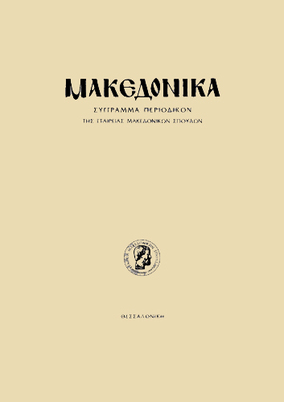Η ίδρυση, οργάνωση και λειτουργία της Γεωργικής Σχολής Εικοσιφοίνισσας Παγγαίου (1909-1912)
Part of : Μακεδονικά ; Vol.32, 2000, pages 365-391
Issue:
Pages:
365-391
Parallel Title:
The Foundation, Organization and Operation of the Eikosiphoinissa Farm School on Mt. Pangaion (1909-1912).
Section Title:
Articles
Author:
Abstract:
After the Turkish constitutional reform of 1908, the national task of finally achieving Greek dominance in Macedonia was pursued along new lines. The new conditions that had been created gave the Greeks an opportunity to achieve dominance through economic progress.The Farm School was established at a dependency of the Monastery of Eikosiphoinissa outside the village of Krommysta (Kormista) on Mt. Pangaion, an area of approx. 1500 stremmas of highly fertile land suitable for the cultivation of cereals, tobacco, industrial crops and pulses. The dependency was very willingly provided by the Monastery of Eikosiphoinissa at the re quest of the Metropolitan of Drama and Zichna, Chrysostomos Kalaphatis.For assistance with the foundation of the Farm School and the provision of financial support Metropolitan Chrysostomos turned to the large monasteries on Mount Athos. One of the first to eagerly respond was the Monastery of Xeropotamou.Kormista was a superb choice of site for the School in that it lay within the Greek-speaking zone of Pangaion, an area that was purely and indisputably Greek. This ensured that the School would be able to function without fear of disruption by Bulgarian raids, movements or revolts.The property contained buildings that adequately covered all the School’s accommodation needs. The monastery also satisfied all the School’s educational requirements and provided the means for students to gain practical experience of bee-keeping, poultry-farming, stock-breeding, forestry and fish farming.The School’s curriculum was published at the Patriarchal Printing-house in 1909 under the title “Curriculum and Regulations of the Eikosiphoinissa Farm School on Mt. Pangaion in the Holy Metropolis of Drama”.The School was to accept boarders and students from villages throughout the region, as well as a number of external students, mainly from peasant families in the neighbouring villages. The school curriculum was organized in such a way as to provide students, within the space of four successive semesters, with all the theoretical and practical knowledge they needed to later become, as farmers established in their own villages, experts in dairy farming, sericulture, bee-keeping, arboriculture and, above all, the cultivation of the famous local Zichna tobacco, and to teach the local people the new types of farming with its new techniques.The date set for the School’s inauguration was 1 March 1909. Despite its favourable prospects, however, and the good wishes expressed on all sides for its success, it was apparent from the outset that the School was going to face serious operational problems.Almost one and a half years after the School commenced its activities, the new Metropolitan of Drama, Agathangelos, requested that state funds be provided to cover its running costs. The Greek Ministry of Foreign Affairs approved an annual allocation of 150 Turkish pounds to ensure the smooth running of the School, recorded in the annual education budget of the Greek consulate at Serres.The main problem appears to have been the direction and financial management of the School. According to the Greek consul at Serres, the Metropolitan of Drama would interfere in all its financial matters and in practice did the Farm School more harm than good.In order to avert an unpleasant outcome, and to secure the money to cover the School’s debts, a group of financiers from Kavala offered to take over control. According to the consul at Serres, if this plan had been finally accepted, it would have ensured that the School was run smoothly and in a respectable manner.The Farm School, however, failed to operate in the 1911-1912 school year as well. At the beginning of 1912 it continued to be dogged by problems. Nevertheless, there was still hope that, if the necessary steps were taken, the School would be able to operate during the following school year, 1912-1913. For this purpose the Greek government was to make available the necessary sum from its education budget for the period 1912-1913. Unfortunately, how ever, and despite the wishes of the Greek Ministry of Foreign Affairs, the Farm School on Mt. Pangaion was unable to function.In the end, the events and developments of the Balkan wars, including the liberation of the Pangaion region in October 1912, put paid to all the plans for the Farm School. The national benefit to be gained from the operation of the School was lost as a result of the rivalry between the two local centres of power, the Greek consulate and the Metropolis of Drama. Both sides share equal responsibility for this since in quarrelling over who should control and manage the School they let slip such an important opportunity for the Greeks of Eastern Macedonia.
Subject (LC):
Notes:
856:https://ejournals.epublishing.ekt.gr/index.php/makedonika/article/view/5738, DOI: https://doi.org/10.12681/makedonika.177
Electronic Resources:




